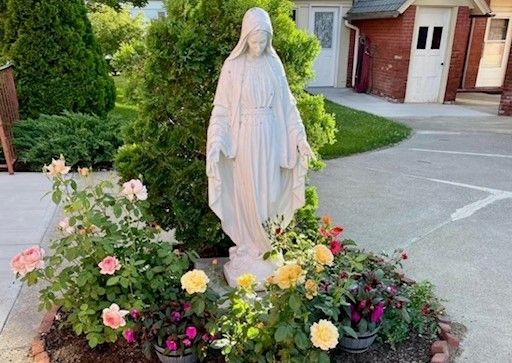 Planting Big Potatoes
Planting Big Potatoes
In today’s gospel, Jesus says, “Unless a grain of wheat falls to the ground and dies, it remains just a grain of wheat, but if it dies, it produces much fruit.”
I’d like to reflect on that one line, but since we are celebrating St. Patrick’s Day this weekend, I thought that, instead of focusing on wheat, it would make more sense to take a look at potatoes.
Many years ago Irish immigrants subscribed to the theory that they could eat all the big potatoes and keep the small potatoes for seed planting. They did this for quite some time. They ate all the big potatoes, and they planted the small potatoes. Soon, however, greater understanding of the laws of nature came to them, for while they kept up this practice, nature reduced all their potatoes to the size of marbles. The Irish farmers learned through bitter experience that they could not keep the best things of life for themselves and use the leftovers for seed. The laws of nature decreed that the harvest would reflect the planting season.
One author, reflecting on the Irish experience, noted that the mistaken thinking is still often used today. We often try to keep the best things of life for ourselves and to plant inferior things. We expect that by some crazy twist of the laws of nature our own selfishness will reward us with unselfishness. Is this not true in terms of our use of time, personal talents, serving others, sharing our faith, living according to the Golden Rule?
We need to remember what the Irish farmers learned: we cannot eat all the big potatoes and still keep on having them through the years. Truly the harvest reflects the planting season.
Jesus’ image in today’s gospel, the grain of wheat dying to itself by being planted in the ground reflects his own gift of self by a life lived for others, even to the point of laying down his life for his friends. And he invites us to make that the pattern of our life as well.
I’ve thought about this a lot lately. We are so fortunate to have plenty of food, even to the point of wasting it, when millions of people go to bed hungry each night. Many don’t seem to care about the harm we are doing to the earth to the point of handing on a severely wounded world to future generations. I worry about the job we’re doing in handing on the faith, as each week I watch children coming up the stairs from their religious education classes, and then continuing out the door with their families without coming to worship.
In Friday’s (3/15/24) Springfield newspaper, The Republican , there was a lead article about six eighth-graders from Southwick who have been charged in connection with alleged racial bullying. The article speaks of alleged series of racist and threatening social media posts aimed at two Black classmates.
A series of Snapchat posts came to light last month, leading to suspensions of some students by the school system. School officials then referred the matter to local and state police.
‘Hatred and racism have no place in this community,’ said Hampden District Attorney Anthony D. Gulluni when announcing the charges yesterday.
The middle-schoolers are facing charges of witness interference, civil rights violations and threatening to commit a crime linked to alleged bullying and bigotry.
Gulluni said the students’ chats included ‘heinous language,’ threats of violence and a mock slave auction.
A follow-up article reports that the students involved could face time in a juvenile facility.
I’m very concerned, not only about the alleged behavior, but also by the fact that we’re talking about eighth graders. Where did this kind of hate come from? These young people certainly did not somehow magically come up with these poisonous attitudes on their own. Surely, they are reflections of the attitudes of many adults in the community. Think of the political rhetoric in this nation, a rhetoric that is filled with racism, attacks on human dignity, fear-mongering, and the use of violence to solve our problems. If we contribute to this kind of fear-induced politics, we are planting attitudes that lead to this kind of behavior by middle school students.
They say that you “reap what you sow.” At all levels, personal, ecclesial and societal, we need to be very careful about our words and our deeds. Certainly, the words that come from Jesus do not lead to prejudice, fear of the other, or hate-based political slogans.
And so, as we honor St. Patrick, let us not forget the lesson his life teaches. His first experience of Ireland was a negative one. At the age of sixteen he was kidnapped from the coast of Britain by Irish raiders, and taken to Ireland as a slave. He was sold to a local king, and was forced to do all kinds of menial work. Finally, after six years, he was able to escape.
Patrick had a strong faith, and he went on to study for the priesthood, eventually becoming a bishop. And rather than hating the people of Ireland, for some thirty years he spread the faith, and is now remembered as the great patron Saint of the Irish. Despite his earlier negative experiences, Patrick planted richly, sacrificed much, and left an incredible legacy—all because he planted big potatoes of selfless love rather than prejudicial hate or revenge.




